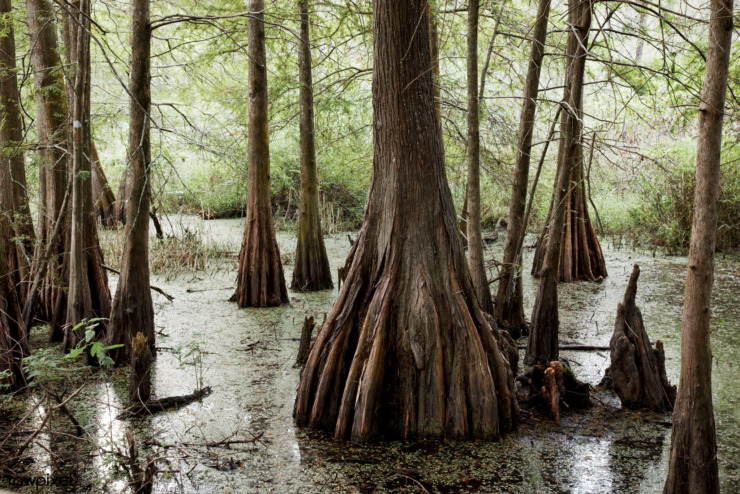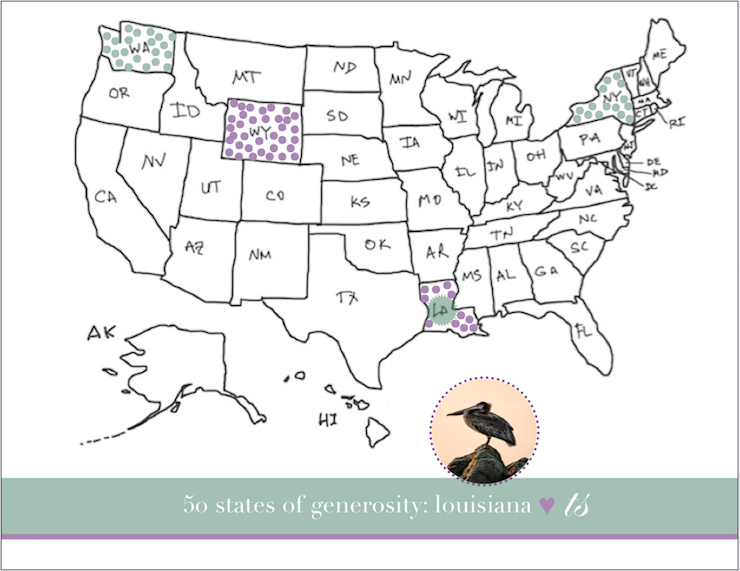50 States of Generosity: Louisiana
We’re continuing a new series at Tweetspeak — 50 States of Generosity. We’ll be highlighting the 50 states of America and giving people beautiful ways to understand and be generous with one another by noticing the unique and poetic things each state brings to the country. A more generous people in the States can become a more generous people in the world. We continue with Louisiana.
Louisiana (capital Baton Rouge)
State bird: the brown pelican. State tree: the bald cypress, with its feathery foliage. State flower: the creamy white magnolia (an evergreen).
Louisiana is a state that defies expectations.
For example, when you think of the Pelican State, you probably don’t picture tall buildings. But Louisiana’s state capitol building is a skyscraper, because that is what former Governor and Senator Huey Long wanted.
The misunderstandings about the state go all the back to 1682, when La Salle claimed the land around the mouth of the Mississippi for France, ignoring the people who already lived there. The French king didn’t see the land’s value and declared it “utterly useless.” Louisiana is now known for good gumbo, good beignets, good jazz, and good times. It’s a state that is mostly Protestant in the north and mostly Catholic in the south. Its three regions (one being the city of New Orleans itself) are as distinct as separate states. Speaking of NOLA, if you’re trying to pin down that accent, don’t think Southern — think Brooklyn.
Here’s a poem by Jericho Brown about New Orleans. Brown, a Shreveport native who won the 2020 Pulitzer Prize for The Tradition, at one time served as speechwriter to the city’s mayor. This is the third and final section of Meditations at the New Orleans Jazz National Historical Park.
3.
Poetry is where
I understand
I am nothing
If I can’t sit
For awhile
In the audience
Or alone, sit down
Awhile and thank
God the chair
Is still warm.
–Jericho Brown
During National Poetry Month I was introduced to a new-to-me poetry form, the duplex, which Brown invented. He describes the form as “a ghazal that is also a sonnet that is also a blues poem of 14 lines, giving each line 9 to 11 syllables.” That creative blending immediately made me think of Brown’s home state of Louisiana.
Because it’s Spanish. It’s French. It’s Chitimacha and Coushatta and Choctaw and Tunica-Biloxi. It’s the African countries from which people were taken and sold in New Orleans. It’s Creole and Cajun. It’s not what you think it is. It reaches high into the sky.
Poetry Prompt: Louisiana Generosities
Use any of the things you learned about Louisiana (research more, if you want!), and put one or more of them into a poem. If you like, weave in a little generosity. Share in the comments.
More About Louisiana: Poets & Writers + Landmarks
Jericho Brown, poet
Ernest J. Gaines, author
French Quarter, New Orleans
Kim Mulkey, women’s basketball coach inducted this month to the Naismith Basketball Hall of Fame
The National World War II Museum, New Orleans
Tennessee Williams, playwright
Mo Willems, children’s author and illustrator
Photo by Rawpixel Ltd, Creative Commons, via Flickr. Post by Megan Willome.
I loved this book. As soon as I finished, I began reading it again.”
—David Lee Garrison, author of Playing Bach in the D. C. Metro
- Perspective: The Two, The Only: Calvin and Hobbes - December 16, 2022
- Children’s Book Club: A Very Haunted Christmas - December 9, 2022
- By Heart: ‘The night is darkening round me’ by Emily Brontë - December 2, 2022



Glynn says
I may epitomize the regions of my native state — born and raised in New Orleans, with relatives on my mother’s side from Cajun Louisiana and on my father’s side from Shreveport. My older and younger brothers both have the New Orleans (Brooklynesque) accent, as did my mother. For some reason, it skipped me; people in New Orleans always thought I was from the Midwest (maybe that’s why I moved there).
If you’re interested in Huey Long, the best biography is still “Huey Long” by T. Harry Williams, which won the Pulitzer Prize in 1969. Apart from building the state capitol (where he would be shot), Long loved LSU. He not only funded the university’s marching band, he would often lead it in parades. He was from Winn Parish in north Louisiana. My New Orleans grandmother thought of him as a saint; my Shreveport grandmother refused to mention his name.
Megan Willome says
Well, I have read “All the King’s Men,’ and I get the divide between your grandmothers. That story is as contemporary as ever.
Perhaps the reason you have so many stories in you is because you are from Louisiana, with all its multiplicities.
Geaux Glynn!
Sandra Heska King says
I’ve never had much interest in Mardi Gras, but this post has made me think more about a trip to Louisiana–especially one of the wildlife refuges, of course. And maybe find a beignet or two or three.
I just got sidetracked researching the differences between Creole and Cajun and reading what I found out loud. D wanted to know what I was doing in LA. I told him it was Megan’s doing.
Megan Willome says
Yes, tell D it is all my fault. 🙂
One of my favorite parts of my interview back in 2012 with Coach Kim Mulkey (https://www.wacoan.com/woty/kim-mulkey/) was when I asked her what it is about Louisiana that makes it so special to people who are from there. She gave me a whole paragraph that nothing to do with basketball!
Patricia Hunter says
Megan, I think it’s interesting to note that Coach Mulkey left Baylor this year to be the head women’s basketball coach at LSU. Her son, Kramer Robertson, was a star baseball player for LSU and is now in the MLB playing for the St. Louis Cardinals.
Megan Willome says
Patricia, believe me, I know. (Sic’em, Bears.)
We did watch her press conference at LSU. Very happy she is finally home.
Mike Zimmer says
I m also of divided loyalties. My father from french cajun country, my mother from the extreme northeast, a tiny town called Lake Providence. I grew up in both regions, grade school in the northeast, high school and college in Lafayette. A great state, for sure, in some respects, but one that has not come close in fulfilling its potentials.
Megan Willome says
Very insightful, Mike. For a smaller state, it contains multitudes.